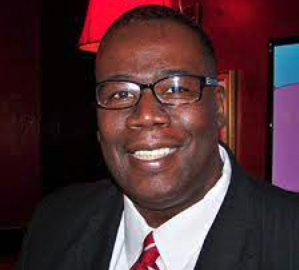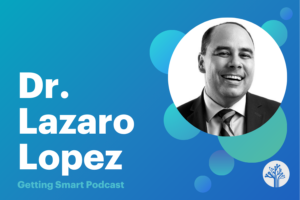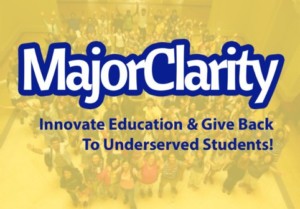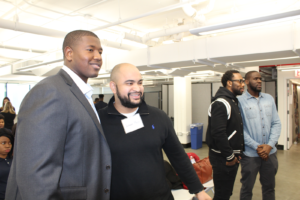Freedom: One Teacher’s Journey to Student Loan Forgiveness
Key Points
-
Canceling student loans is an essential first step in fixing our broken higher education financing system.
-
Here is how one teacher has been impacted by student loan debt for several years.

Making a living, raising a family, and paying off student loans have many teachers questioning whether they can stay in the profession. Others are still paying off loans after they retire. I spoke with one teacher who has been impacted by student loan debt for several years and was overjoyed to learn that he recently, in his fifties, had some of his loans forgiven.
Anthony McCutchen was born in the small rural community of Kingstree, SC, in 1968. He is the fourth of five children raised by parents who were sharecroppers. Even though his parents were not well educated, they governed their home with spiritual guidance, the strength of character, and education as their top priorities. Due to a lack of money for college, Anthony’s dream of becoming a certified teacher developed into a long and arduous journey. He attended Hemingway High School in Hemingway, SC, and graduated with academic honors. However, he could only garner small academic scholarships that did not fully cover his college fees. Consequently, he relied heavily on student loans and worked part-time jobs throughout college.
One in four borrowers were in default or severe delinquency even before the COVID-19 pandemic, with many having to choose between paying their student loans and eating. Many other borrowers were struggling to stay afloat, manage their debt, and were unable to contribute fully to the American economy. Canceling student loans is an essential first step in fixing our broken higher education financing system.
Through much hard work and perseverance, he earned a Bachelor of Arts in Biology from the College of Charleston. Even though Anthony wanted to attend graduate school to pursue education, he worked as a pharmacy technician and customer service representative to begin paying back his student loans. Within two years of completing his undergraduate degree, he married and had two beautiful children a few years later.
Before becoming an educator, he served as a Program Director for HOPE worldwide in Charleston, South Carolina. He developed and conducted health and education outreach programs specifically targeted at improving the quality of life in Charleston’s underserved communities. Additionally, he managed and taught at Saturday Academy, which coupled academic tutoring with weekly character lessons, cultural arts, sports, and a computer lab for Kindergarten through 5th-grade students. He and his team went door-to-door in underserved communities and built a bond of trust with children and families. These experiences were the catalyst that led to his career as an educator. During this time, Anthony continued to pay his student loans faithfully. Through research, he became aware that his public service work should help him to qualify for loan forgiveness. He applied for public service loan forgiveness but was rejected based on a restriction on the date of his original loan.
Canceling student loans is an essential first step in fixing our broken higher education financing system.
Antonio Boyd
Finally, in January 2011, Anthony was chosen for a Literacy Intern Program partnership between the College of Charleston and the Charleston County School District. This program specifically recruited African American men to teach in elementary schools. He completed the Literacy Intern Program with academic honors and became a certified elementary school teacher in January 2012. However, when he received his master’s degree in Early Childhood Education from The College of Charleston, he had amassed $30,000 in student loan debt. Even with a master’s degree, his teaching salary only allowed him to make minimum payments toward his student loan debt.
While teaching full-time, he continued to work part-time jobs to make ends meet. His part-time jobs have included Uber driver, grocery store clerk, retail store clerk, weekend assistant retail manager, community theater actor, and movie extra roles. Financial challenges have been tough in the last five years. During this period, his household income decreased significantly when the company downsizing forced his wife to change jobs and accept a lower salary. His wife’s salary was much larger than his salary as an elementary school teacher. Simultaneously, due to failing health, his mother-in-law moved into their home. The concurrent increase in household expenses and decreased household income made it very strenuous to make student loan payments.
After completing five years of teaching in almost 100% high-poverty areas, Anthony consolidated his student loans and continued making loan payments. With an excellent payment history and years of public service, he was optimistic that he would now be approved for student loan forgiveness. Unfortunately, both his teacher forgiveness and public service forgiveness applications were rejected. Both times, he received notifications stating that his original loans were too old or that he used the wrong type of loans. Also, in the Fall of 2020, Anthony’s daughter started college. Paying for her college and his student loans only compounded the stress of making student loan payments.
When the 2021-2022 school year began, Anthony celebrated ten years as an educator. After years of financial struggle, he and his wife had lowered the $30,000 student loan debt to $13,000. When Anthony became aware that the Biden Administration had relaxed many of the restrictions that had blocked his student loan forgiveness in the past, he decided to make a fourth attempt in February of 2022. After multiple hours on the phone with student loan representatives, the representative told Anthony that he had completed all the required documents, but the review could take up to 90 days. In early June 2022, Anthony received a notification in the mail that his student loan application was once again denied. Despite being devastated and a bit discouraged, Anthony knew that giving up was not an option. As always, he prayed to God and carved out some time to make another long phone call to plead his case. Before the appointed time to make the phone call arrived, he finally received a letter stating his documents for student loan forgiveness were reviewed a second time. Complete student loan forgiveness was approved! His journey to student loan forgiveness had taken almost two decades!
After all the financial struggles and the back and forth with the student loan process and the current salary crisis teachers face, I asked Anthony why he still wants to teach when so many of his colleagues have left the profession, especially after COVID-19. He shared, “I am a positive male influence! As an African American teacher and mentor, I inspire my students to choose their futures instead of being defined by their environments. I help shape character. I can model and cultivate the characteristics of love, respect, responsibility, and integrity in the hearts of my students. Character and life lessons are woven into my school’s curriculum and taught in all my assignments.”
Anthony currently serves as the second-grade teacher at Charleston Development Academy Public Charter School. He has built a reputation as a fair and firm educator that cares deeply about his students and families. Aside from teaching, he serves as the assistant State Testing Coordinator and the Gifted and Talented Testing Administrator.
He is also very enthusiastic about worship ministry and the performing arts. His worship ministry experience has allowed him to perform in multiple musical and dramatic productions in the Charleston area. His greatest theatrical experience was playing Levi Pearson and Dr. Kenneth Clark in the 2016 production of “The Seat of Justice.” These two men played pivotal roles in contributing to the landmark Brown vs. Board of Education decision in 1954. Many students from his school and fifty supporters from the community attended the play.
There is much debate about whether student loan debt cancellation is fair, good for the economy, or even makes sense. Clearing the way for teachers and students to participate in the economy by purchasing homes, launching small businesses, saving for retirement, and boosting the economy by patronizing local businesses makes a lot of sense! Anthony’s story and the impact that he has had on his students and community reminds me of the words of Nelson Mandela: “Education is the most powerful weapon which you can use to change the world.”








0 Comments
Leave a Comment
Your email address will not be published. All fields are required.